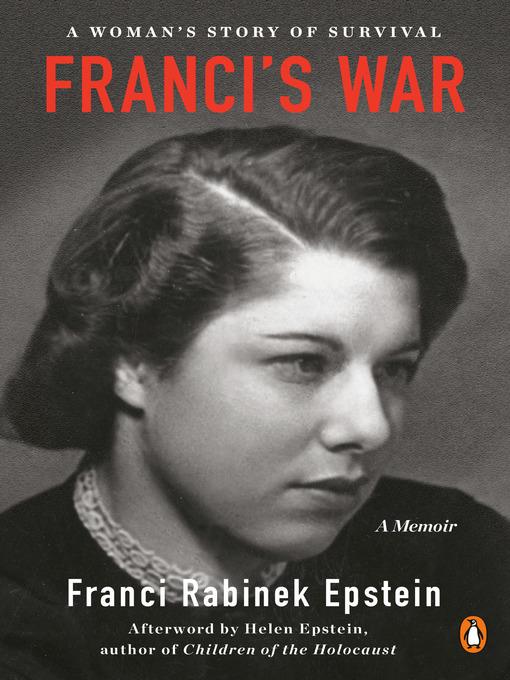
Franci's War
A Woman's Story of Survival
فرمت کتاب
ebook
تاریخ انتشار
2020
Lexile Score
1120
Reading Level
7-9
نویسنده
Helen Epsteinشابک
9780525507222
- اطلاعات
- نقد و بررسی
- دیدگاه کاربران
نقد و بررسی

January 15, 2020
A Holocaust memoir by a secular Czechoslovakian Jew who was 22 when she was rounded up with her family to be deported to Terezín in 1942--only the first step of her wartime misery. Epstein (1920-1989) wrote this brief, striking memoir in the mid-1970s, largely for the benefit of her children. Her daughter, Helen Epstein (The Long Half-Lives of Love and Trauma, 2017, etc.), a writer who struggled her entire life to grasp her mother's awful wartime experiences and her own trauma as the child of Holocaust survivors, could not face returning to it until recently. Here, she does a fine job of clarifying some of the detail and characters. A youthful zest for life comes through despite "Franci's" many travails. She demonstrates a fierce determination to adapt and prevail amid the harshest conditions. First, she watched as her parents, middle-class members of the German-speaking community in Prague, were brutally separated from her at Terezín to be sent to the Nazi death camps. Life in the barracks of Terezín was fraught but bearable, and Franci keenly observes the hierarchy of survival, where the well-connected enjoyed benefits not available to all, and "a whole new standard of behavior evolved, much of it self-sacrificing and noble, but also frequently selfish and amoral." Married hastily to a young man from home who was able to help them survive by his canny trading instincts, until he was caught and disappeared, Franci was herded into the cattle cars for transport to Auschwitz in May 1944. There, her cousin made her aware of what was burning in the chimneys; she "became conscious of a peculiar odor in the air, like burning hair or bones." From then on, the author refers to herself by her camp tattoo number, A-4116, and she chronicles how she endured the brutal conditions and disease at several women's camps by using her sewing and electrical skills. Further useful testimony from an unspeakably terrifying era.
COPYRIGHT(2020) Kirkus Reviews, ALL RIGHTS RESERVED.

February 21, 2020
Born in Czechoslovakia in 1920, Epstein was a secular woman caught up in the maw of the Holocaust. Baptized Catholic and brought up to think of herself as a citizen of the world with no religious affiliation, she describes in this memoir--originally written in the 1970s but published here for the first time--of how the 1939 Nazi invasion of her country rechristened her Jewish, as she had four Jewish grandparents. Epstein recounts her journey from concentration camps Terezín and Auschwitz-Birkenau to German labor camps and Bergen-Belsen to postliberation Czechoslovakia. In a compelling voice, she illuminates the horror, shock, small graces, and capriciousness of surviving the Holocaust. Her daughter Helen Epstein, author of Children of the Holocaust, contributes an afterword detailing her mother's eventual marriage and life in the United States. She places this account in context of other exceptionally honest portrayals of what happened in the death camps. VERDICT This worthy account is testament to why it is as important as ever to read about the impacts of xenophobia, anti-Semitism, and racial hatred, as well as the beliefs that cause some people to commit atrocities while others pretend to look away.--Laurie Unger Skinner, Highland Park P.L., IL
Copyright 2020 Library Journal, LLC Used with permission.

Starred review from February 15, 2020
When Hitler invaded Czechoslovakia during WWII, Franci Rabinek, the only child of secular Jews, was a young bride. Her new husband was missing and she had just had surgery when her family received their deportation orders. This searingly honest memoir recounts Rabinek's subsequent incarcerations, as she was shuffled from Terez�n to Auschwitz to Bergen-Belsen. She was able to brave the deprivations quite capably until her cousin Kitty, a fellow detainee, told her the brutal truth about the crematoriums. Horrified, Rabinek relates that this caused her psyche to split in two: the person she had been, and a new, piteous creature with an arm tattoo. At this point in the memoir, her first-person viewpoint is replaced by a detached, third-person narrative about A-4116, Rabinek's tattooed ID alias. Somehow, A-4116 survives unimaginable atrocities, and the first-person voice resumes once Rabinek is liberated. She's alive, but her mother, father, and husband are gone, and she's faced with a drastically different postwar reality. Published by her daughter, journalist Helen Epstein (Where She Came From: A Daughter's Search for Her Mother's History, 1997), and supported by archived audio and video testimonials from survivors, this devastating account documents a personal slice of Holocaust history.(Reprinted with permission of Booklist, copyright 2020, American Library Association.)




دیدگاه کاربران